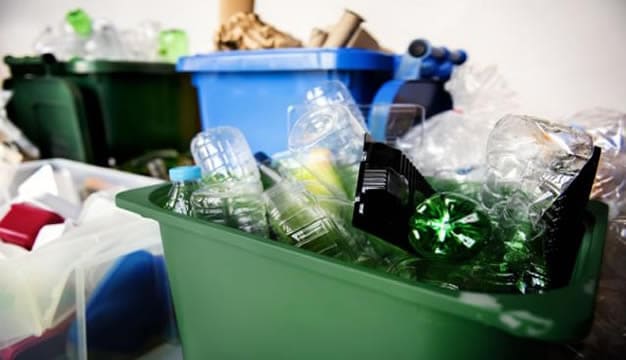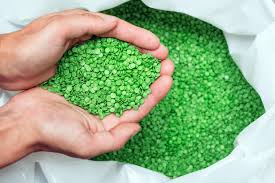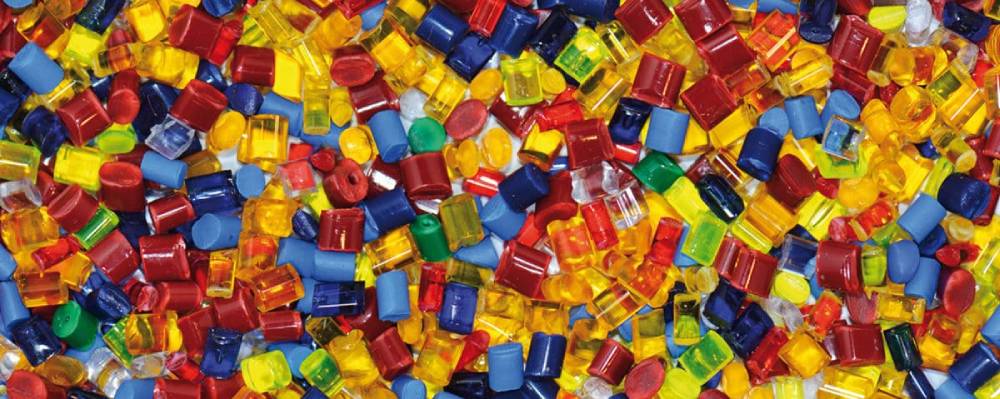Currently, searches seek to develop raw materials similar to plastic, which are recycled and biodegradable.
A big improvement in this area was the green plastic or green polyethylene production from sugar cane. This product is 100% recycle and it does not contaminate the soil or the atmosphere.
These raw materials have the potential to replace the fossil originated plastics, a derivative of petroleum, which currently used in the production of bags, toys, and domestic utensils.
Polyethylene, for example, is a resulting polymer of successive addition of ethylene molecules (or ethene). With it, various objects are manufactured, such as water bottles, plastic bags, tables, towels, and many other packing types.
The problem is that this plastic is not biodegradable. That is, it's not degradable by microorganisms, fungi, and bacteria. So, when thrown away, it remains in the environment for decades or centuries. Besides that, plastic contributes to the addition of carbonic gas to the atmosphere, the main trigger of global warming.

Discover plastic recycling initiatives in Brazil
According with the Brazilian Association of Plastic Industry (ABIPLAST from Portuguese), the Brazil manufactured packs total recycling index is around 24%.
The country annually generates around 79 million tons of urban solid residues (plastic bottles, aluminum tin, paper, glass, steel tin, and long-life packing).
According to PICPlastmost of the recycled plastic in Brazil is originated after domestic use (52.5%). The remainder is divided between the not-domestic use (19.5%) and industrials residues (28%).
Raw material arrives at recyclers through plastics industries (28%), scrap dealers (26%), beneficiaries (17%), cooperatives (12%), waste management companies (8%), collectors (4%), straight from generation source (3%) and sanitary landfills (2%).
The problem is that almost half of the Brazilian counties (49.9%) still throws plastic residues in sanitary landfills - irregular and illegal deposits - according to the Urban Cleaning Sustainability Index (ISLU in Portuguese). To make this situation worse, only 3.85% of these residues are recycled.
Follow the recycling growth in Brazil
It’s noticed that Brazil has a mature and diversified plastics recycling industry, but it needs more incentive to expand.
In 2019, the domestic use recycled plastic volume was of 838 thousand tonwhile in 2018 was recycled 757 thousand ton. The not-domestic use recycle index, in 2019, was 24%, while in 2018, 22.1%. MaxiQuin and the Plastic Chain Incentive Plan (PicPlast), a partnership between Abiplast and Braskem, made the survey.
According to the research, in 2019, it was consumed 1.3 million tons of plastic residue from recycling, with a growth of 5.2% over 2018. From these, the total of 953 thousand tons are domestic use plastic, residential waste, commercial establishments, offices, etc.
Besides that, Brazil consumed 370 thousand tons of industrial plastic, like petrochemical industry process scraps, from the plastic transformation, and recycling plastics.
Find out how plastic is reused by industry
Because of your resistance and lightness properties, plastic is strongly present in sectors such as civil construction, automobile, auto parts, furniture, and electronics. This application for a long cycle is responsible for more than 52% of the plastics products consumer market.
According to the Abiplast, the main transformed plastic consumers in Brazil are:
- Civil construction (23.8%);
- Automobile and auto parts (7.2%);
- Metal products (5.6%);
- Machine and equipment (5.6%);
- Furniture (4.6%);
- Electronics (1.9%);
- Transport and other equipment (0.6%).

Check how rotomolding uses recycled plastic
The rotational molding process presents a large raw material utilization with low residual stress generation. In the rotomoulding process, almost every Brazilian plastic transformation companies - about 99% - have mills for recovering scraps from the productive process, such as dregs, shavings, and others, as the research made by the magazine “Plástico Industrial”.
http://www.arandanet.com.br/revista/pi/materia/2018/03/13/reciclagem_de_materiais.html
However, when the raw materials are recycled products, contaminated, compounds, laminated or multilayered, that involves sorting and separation, this process becomes more complex. Some companies are developing solutions for plastic materials recycling and using it in grains for the plastic transformation market.
Get to know the challenges for the recycling future
The greatest difficulty for the recycling industry is the access of transformers to plastic to be recycled. In addition, it is still in the regulation phase, the legislation about plastic recycling must provide great progress to the sector, which has a big potential of evolution for next years.
Therefore, recycled plastic also has lots of space to grow up and needs to be stimulated in the country. To enlarge the domestic use index, the development of a collect system to these residues in the Brazilian counties - only 18% of more than 5.5 thousand cities have some type of system of selective collection.
The plastic processing industry has been promoting growing efforts for recycling of domestic use materials, such as the bioplastic development and recycling of industrialist products.





